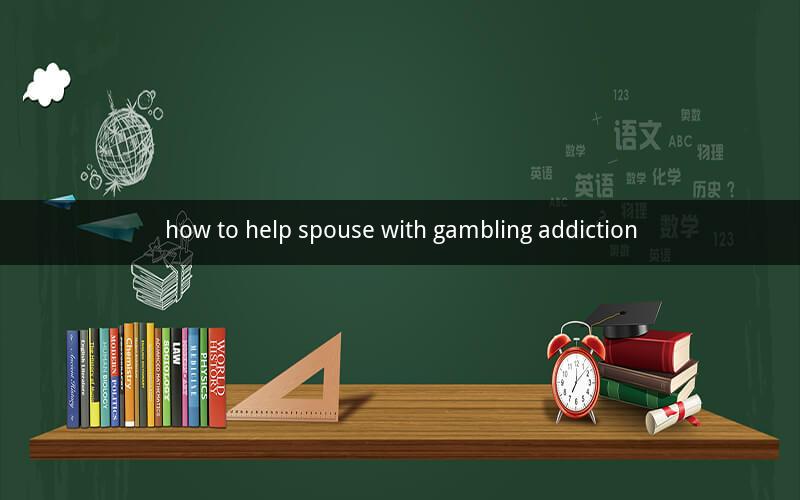
Table of Contents
1. Understanding the Problem
2. Communication and Support
3. Encouraging Professional Help
4. Setting Boundaries
5. Financial Management
6. Education and Awareness
7. Coping with Emotional Challenges
8. Joining Support Groups
9. Promoting Positive Lifestyle Changes
10. Maintaining Patience and Hope
---
1. Understanding the Problem
Gambling addiction, often referred to as a behavioral addiction, is a chronic condition characterized by the inability to control or stop gambling despite negative consequences. Recognizing the signs and understanding the nature of the addiction is the first step in helping your spouse cope with this challenge.
1. Communication and Support
Open and honest communication is crucial. Encourage your spouse to share their feelings and experiences without judgment. Be a supportive listener and offer empathy. Avoid confrontational language that might make your spouse defensive.
1. Encouraging Professional Help
Professional help can make a significant difference. Suggest therapy, counseling, or support groups that specialize in gambling addiction. A therapist can provide strategies for dealing with triggers and developing healthier coping mechanisms.
1. Setting Boundaries
Establish clear boundaries to protect your family from the effects of gambling. This may include setting limits on finances, access to gambling activities, and even living arrangements if necessary. Consistency is key.
1. Financial Management
Financial strain is a common consequence of gambling addiction. Help your spouse manage their finances by creating a budget, paying off debts, and seeking financial counseling if needed. Be prepared to take control of the household finances if your spouse is unable to do so.
1. Education and Awareness
Educate yourself and your spouse about gambling addiction. Understanding the causes, effects, and treatment options can empower both of you to make informed decisions. Share resources such as books, websites, and documentaries.
1. Coping with Emotional Challenges
Addiction can lead to a range of emotional issues, including depression, anxiety, and anger. Encourage your spouse to seek emotional support through therapy or support groups. Practice self-care and seek support for yourself as well.
1. Joining Support Groups
Support groups like Gamblers Anonymous can provide a sense of community and understanding. Encourage your spouse to attend meetings and connect with others who have faced similar challenges.
1. Promoting Positive Lifestyle Changes
Encourage your spouse to engage in healthy activities that can replace the urge to gamble. Exercise, hobbies, and socializing with non-gambling friends can all be effective. Celebrate small victories and milestones.
1. Maintaining Patience and Hope
Recovery from addiction is a gradual process that requires patience and perseverance. Understand that relapses are possible and offer unconditional love and support. Celebrate progress, no matter how small.
---
10 Questions and Answers
Q1: How can I help my spouse stay motivated during recovery?
A1: Recognize and acknowledge their efforts, no matter how small. Celebrate milestones and encourage them to set realistic goals.
Q2: Should I confront my spouse if I catch them gambling?
A2: Confrontation can be counterproductive. Instead, express your concerns calmly and encourage them to seek help.
Q3: Can I force my spouse to seek treatment?
A3: No, you cannot force someone to seek treatment. However, you can offer support and information about available resources.
Q4: How can I protect my children from the effects of gambling addiction?
A4: Establish clear boundaries, provide emotional support, and educate them about the issue in an age-appropriate manner.
Q5: What if my spouse is secretive about their gambling activities?
A5: Encourage them to be transparent. If they refuse, consider seeking help from a therapist who can help address trust issues.
Q6: How can I manage my own stress during this time?
A6: Practice self-care, seek support from friends and family, and consider therapy to help you cope with the emotional toll.
Q7: Is there a cure for gambling addiction?
A7: There is no single cure, but recovery is possible with the right support, treatment, and lifestyle changes.
Q8: What should I do if my spouse's addiction is causing financial ruin?
A8: Seek financial counseling, create a budget, and consider legal advice if necessary. Be prepared to take control of the household finances if your spouse is unable to do so.
Q9: Can a person with a gambling addiction ever fully recover?
A9: Yes, many people with gambling addiction can achieve long-term recovery with proper treatment and support.
Q10: How long does recovery from gambling addiction usually take?
A10: Recovery can vary widely from person to person. Some may recover within a few months, while others may need ongoing support for years.